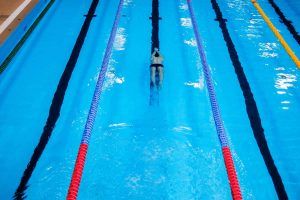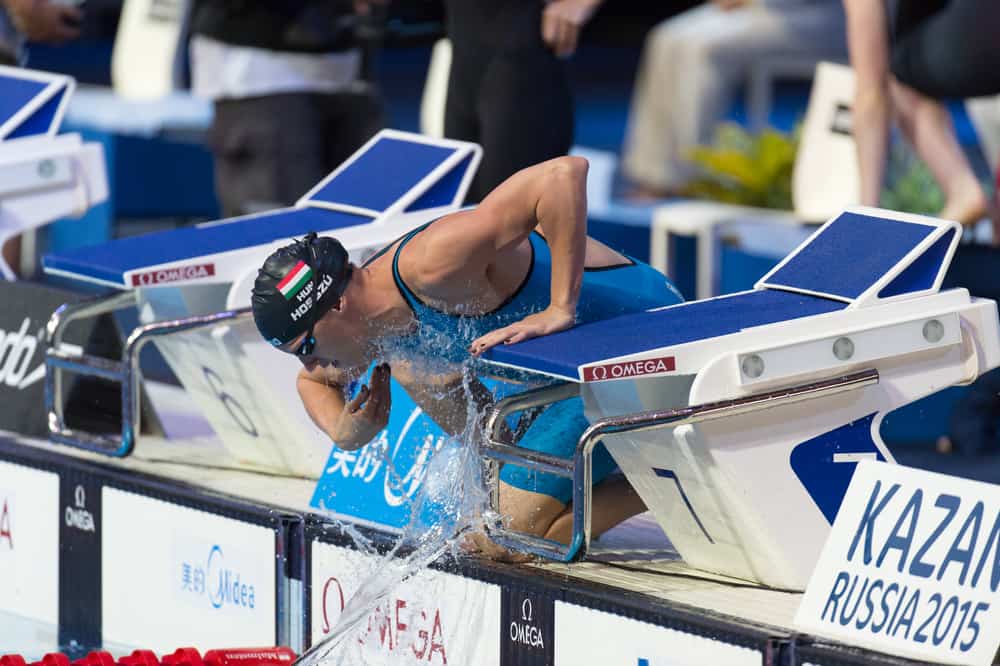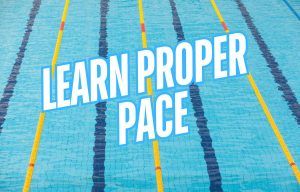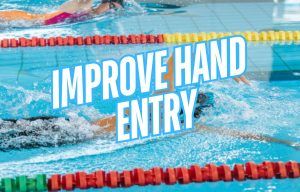
3 Stretches for More Undulation When Underwater Dolphin Kicking
Undulation is key for swimmers looking to improve their underwaters. Here are some stretches for improved range of movement and kicking speed.

Standing on the blocks you stare down the flat, cool water, and take a big breath. The training has been done. You made it to all the available workouts. Did extra core work on your own. And even started taking your nutrition seriously.
And yet, you feel your mind racing away from you:
The swimmer in lane 4 looked like he was really taking it easy in prelims. Is he going to dust me tonight? That last sprint during warm-up didn’t feel as good as I did this morning. Am I going to swim slower in finals? This is it, this race is the sum of who I am as an athlete, and if I don’t at least destroy my PB it’s all going to have been for nothing.
Yowza.
In moments like this our anxieties take over, leading to a situation where you have difficulty performing in a manner that reflects the awesome training you have done to date. A situation where the worst of your fears comes to pass… you choke.
We’ve all been there at some point.
Where our thoughts ended up dictating our performance. Where physically we were as ready as ever but our brain-noodle-thing simply didn’t want to keep up.
Here is how being a more mindful swimmer can help you relax, stay focused, and perform better in the moments that matter most:
What is mindfulness, exactly? Is it sitting atop a mountain, in a yoga pose, face to the sun, quietly humming in hippie gear? Not quite.
It’s a tool that you use to increase awareness by paying attention to the present moment on purpose. Mindfulness allows you to take control of what is going on in your head so that you can better perform with your body.
It can help us chill out when we are getting too anxious. In the days, hours and minutes leading up to the big race it’s natural to start to get a case of the butterflies. This nervousness can be good—to a degree. It’s when you start to get stressed and too caught up in the outcome that problems arise. Instead of focusing on the preparation and the moment you lose a sense of perspective and focus. In other words, you choke.
It keeps us calm in the face of adversity. When done properly mindfulness helps you to react to unfolding events, moment by moment in a non-judgmental manner. In other words, you don’t blow your lid or get overly frustrated when things don’t go your way. It’s a chill form of resilience.
Helps us stay on top of the self-talk going through our head. It’s bad enough having someone else tell you that ya stink, but when it’s the voice between your ears its exponentially more deflating. For a moment think about all of the self-talk you engage in over the course of the day, and consider how much of it is awful. Some of the more popular ones: “I suck. I’m no good at this. I’ll never be a fast swimmer.” Mindfulness puts a muffler on that self-talk by blocking everything out.
Helps dial down our perfectionism. “All-or-nothing” thinking is rampant. We feel like things have to be executed exactly to standard, or not at all. As a result, we end up doing a lot of stop-and-go with our training/racing when we don’t reach the impossible standards we set for ourselves. Particularly during bouts of hard training mindfulness can give you the perspective to be more consistent so that when you have one bad workout it doesn’t spiral into a bender of missed practices and Doritos.
You don’t need me to tell you that getting too anxious before a big race or really tough workout can be a problem. (But I’m going to anyways.)
Overly worrying about the outcome can yield negative performance benefits, as shown by a study in the UK that found simply calling a trial a “competition” versus calling it “practice” ended up causing increased cognitive anxiety (a.k.a. “choking”).
Fortunately, there is a vast amount of research that backs up the claims behind mindfulness:
Okay, okay—so the stuff works.
How do we do it and implement it into our training so that we can mentally live life a little more Zen and a little less like a hyperactive chicken on half a case of Red Bull?
Like anything, practicing mindfulness takes, well, practice! And the more you do it the better you get at it.
It starts with focusing on your breath, and then as you get better at it you can move on to focusing on emotions and thoughts.
Here are two methods you can use to get into the mindfulness habit:
The simplest way to practice mindfulness is by focusing on your breathing. No special handbook, yoga mat or incense candle required. Just you and focusing on your breath.
Find a quiet spot, turn off the phone and turn down the television and your siblings and breathe. Focus on the inhalation and the exhalation of your breath.
Long, deep breaths. Start with 1-2 minutes and work your way up from there. You can use this “trick” before a big event or big effort as well to help slow your heart rate and dial back anxiety.
Best of all is that it’s highly versatile: you can do it in the back of the car, on the couch, in bed at night, when you are about to take off on a plane, or standing before the whiteboard while coach outlines the ridiculous set to come later in the workout.
Doing a quickish body scan is another versatile and convenient mindfulness technique.
Sitting in a chair or lying down (careful you don’t doze off…) focus on how different parts of your body all feel while sitting or standing. How your feet feel against the floor. How your head feels against the pillow. Your shoulders touching the chair.
When you catch your thoughts drifting away (what is for dinner?) bring your attention back. Here is a link to a 5-minute body scan video that you can use to guide you (also includes 3-minute and 10-minute scripts as well).
Mindfulness work is a tool that you can add to your training and competitive arsenal in order to help you stay in a positive, calm and focused state of mind. In moments of stress it can help you regulate your emotional level to the situation at hand.
Will you always need it? Probably not, there will be moments where you are mentally ready to absolutely rock and roll.
But for the moments where you feel like you need some perspective, to tone down the butterflies, and to enjoy the moment, throw some mindfulness training at it.
Subscribe to the YourSwimLog.com newsletter and get tips and advice on how to swim faster every weekday morning, straight to your inbox.
Join 33,000+ swimmers, coaches, and swim parents learning what it takes to swim like a boss.
Unsubscribe anytime. Email will never be shared or sold.

Olivier Poirier-Leroy Olivier Poirier-Leroy is the founder of YourSwimLog.com. He is an author, former national level swimmer, two-time Olympic Trials qualifier, and swim coach.

Undulation is key for swimmers looking to improve their underwaters. Here are some stretches for improved range of movement and kicking speed.

Looking to improve your turns in the pool? Here are some sets, drills, and tips for faster turns and faster swimming.

Improve energy efficiency, endurance, and swimming speed with these swim workouts for learning proper pacing.

Ready to take your underwaters to the next level? Here are three things swimmers can learn from one of the fastest swimmers and dolphin kickers on the planet.

Looking to get more speed from your kick? Add this dryland exercise to your swimming warm-up before your next all-out kick set.

Dive into a perfect freestyle hand entry with our guide to faster, more powerful freestyle swimming.

LANE 6 PUBLISHING © 2012-2024 · PRIVACY POLICY · RETURN POLICY · TERMS OF SERVICE · AFFILIATE DISCLOSURE